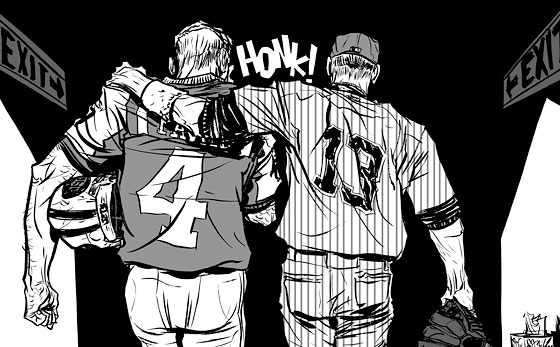
In his five years in New York, Alex Rodriguez has been a Playoff Choker, Adulterer, Desirer of the She-Male Muscular Type, Swooner of Madonna, Stalker of Jeter, A-Fraud, and now Steroid Abuser. In his six months in New York, Brett Favre has been a Savior, Sower of Locker-Room Discord, Joe Namath Legend, Interception Machine, Indulgent Egotist, Mystic Sage, and now Old Guy Whose Time Has Come and Passed. They have both, more than anything else, been about their own drama.
It is telling—and ultimately, cleansing—that two of the biggest names in sports have become, here in New York, punch lines to epic jokes they’re not in on. In the rest of the world, Brett Favre is the heroic Everyman, just the grizzled gunslinger who loves chucking the ball downfield like he’s in his backyard. Here, he’s just another underwhelming Jets quarterback. Everywhere else, Alex Rodriguez is an odd baseball wunderkind who might end up breaking every record. Here, he’s just tabloid fodder who can’t hit in the playoffs. And they’re both exhausting.
In the wake of the most recent acts in their ongoing arias (A-Rod’s steroid admission and Favre’s retirement, one hopes for the last time), it’s worth taking a moment to note that the days of Reggie Jackson are now officially behind us. All the drama, all the look-at-me spectacles that we once admired here—a big city deserves big personalities!—has fallen away. Self-indulgent, pretend spectacle just doesn’t seem that interesting anymore. Sports are, by their very nature, diversion: Athletes are paid to entertain and amaze. To be excellent. Our national leaders squabble over our future, our metropolitan overclass has lost its moorings, our bankers are begging for cash, our obnoxious overachievers have shrunk into subsidized whiners. Athletes, and their ability to still do something truly beyond us, can collectively lift us up. The idea, as old fashioned as this might seem, is that they can be—inspiring. Not all too human. We care less about their psyches—the squishy notion that A-Rod feels “sorry” about using steroids, or that Favre will miss competing—than their game. Favre was once the best quarterback in the NFL, and Alex Rodriguez might currently be the best player in baseball. That should be enough to give us that amnesia from our lives that sports is uniquely skilled at providing.
It’s enough, strangely, to make you appreciate Derek Jeter even more. Sure, his cold, corporate efficiency is both dull and as self-serving as Favre’s and A-Rod’s manufactured personality arcs. But in a sports world of Michael Jordan all-things-for-all-people shill wannabes, it’s a relief to at least see somebody do it well. Jeter keeps the focus on the game rather than on his own psychodrama.
It’s going to be difficult for Favre to muster up much more juice now that he’s retired, but you know he’ll still try. A-Rod’s going to remain a problem, though. An athlete as talented and as needy as A-Rod is, is always going to be in our face: He hits bottom, and the next thing you know, he’s photographed canoodling at a club. Perhaps a little advice from Motherless Brooklyn to the self-aggrandizing Favre and A-Rod: Tell your story walking.
Have good intel? Send tips to intel@nymag.com.
